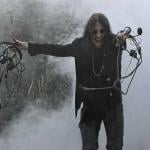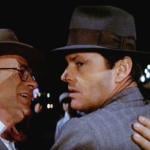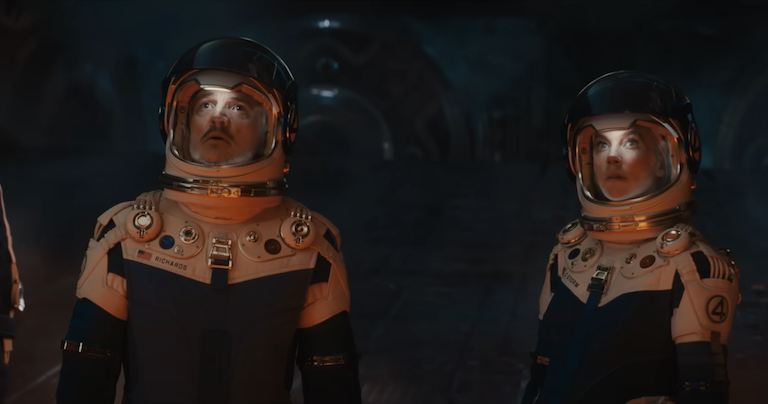
The Fantastic Four: First Steps is the best movie ever made about Marvel’s First Family.
Well, OK, that’s not hard, given the Fantastic Four’s spotty cinematic track record. A 1994 film was so bad that it was never released. The 2005 version was a box-office success but a critical failure. And the less said about the 2015 reboot, the better.
The 2015 version is a sterling example of what can go wrong with a superhero movie: Director Josh Trank wanted to take this inherently sunny, funny superhero squad and stick them in a world more akin to Christopher Nolan’s Dark Knight movies. It failed spectacularly.
So for First Steps, Marvel decided to go down a different road. Instead of plucking our optimistic heroes from their 1960s roots and stuffing them into a grim, gloomy, they bring moviegoers into their world: A sleek, stylish, retro Earth 828. And that’s a big reason why it works.
But it’s not the only reason. Good movies have heart, and this has it. Great movies contain themes that pluck at our darkest fears and deepest yearnings, and First Steps has that, too. You’ll find some spiritual themes and religious echoes worth examining. And let’s begin with …

Galactus
He’s a big dude. I mean, seriously big. They don’t call him the “Devourer of Worlds” for nothing: He literally eats planets. And while his canonical comic-book height is said to be just under 29 feet, he could grow significantly larger. In First Steps, just his face seems almost as long as the 305-foot-tall Statue of Liberty. So, yes. Big.
But it’s not just Galactus’ size that sets him apart. Or even his very impressive powers. Or his truly awesome helmet. It’s his hunger.
Jack Kirby–a Marvel legend and, with Stan Lee, the creator of The Fantastic Four—once said that his inspirations for both Galactus and the Silver Surfer (who we’ll get to in a second) were Scriptural. “For some reason I went to the Bible, and I came up with Galactus,” he said in the film The Masters of Comic Book Art. “And there I was in front of this tremendous figure, who I knew very well because I’ve always felt him.”
Kirby has said that Galactus was God. But when you’re looking at First Steps, this godlike being is the antithesis of the God we would know. God—at least the God in Western religions—is a Creator. Galactus creates nothing. He only destroys.
The great theologian Augustine argued that evil can’t create: It can only mess up what God has made. In the Bible, we read that the Abyss (hell) is ruled over by an angel named Abaddon (in Hebrew) and Apollyon (in Greek), which both mean “Destroyer.”
If Galactus is a god (and he’s referred to as such on more than one occasion), he’s a twisted god—one bent and broken by his compulsions. But in the film, Galactus’ vibe isn’t straight-up diabolical, exactly: Just inexorable. He’s driven by a hunger he cannot sate and he, too, longs to escape this horrible destiny. It reminds me, just a bit, of Satan from Dante’s Inferno—trapped in the Ninth Circle of Hell, both ruler and prisoner. And, as Dante writes, “He wept with all six eyes …”
But Galactus doesn’t come alone. He has a herald.
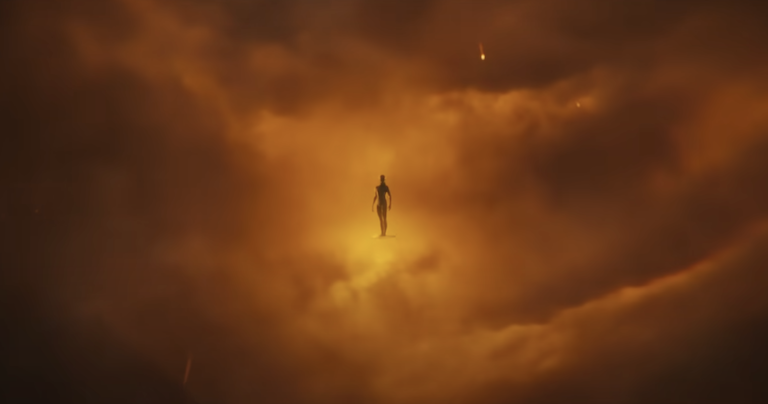
The Silver Surfer
Kirby and Lee’s comic-book character Silver Surfer is one of comicdom’s most enigmatic characters: a creature of unimaginable power but with a childlike mind. One not altogether good, not altogether evil. And In The Masters of Comic Book Art, Kirby says that the character’s inspiration came from the Bible, too: He described the Silver Surfer as the “fallen angel.”
That fallen angel is, of course, Lucifer. And certainly, the shiny beauty of the Surfer reflects a bit of the original biblical imagery. The name in Hebrew means (according to Strong’s Concordance) “shining one” and “light bearer,” and Isaiah compares Lucifer to a fallen star (Isaiah 14:12).
But while the original Silver Surfer in the comics was a guy named Norrin Radd, in First Steps the Surfer switches genders and is given a different name: Shalla-Bal.
It’s an interesting name (and one that in the comics belonged to the Silver Surfer’s original love interest). But some have suggested the name may be an Anglicized version of Hebrew. If it is (as Zac McKracken seems to suggest here), the name could be translated into “Shelah Baal.” The first part of the name comes from the Hebrew word shalah, which means “to send.” Very fitting for a herald. And readers of the Bible should be very familiar with the name Baal—a Canaanite god whom Israel’s prophets were continually embarrassing. Thus, Shalla-Bal just might mean one sent by a counterfeit god.
And Shella-Bal enters the First Steps story with a very chilling, scripturally tinged announcement—a twist on the biblical Alpha and Omega from this twisted, hungry titan.
I herald his beginning.
I herald your end.
I herald Galactus.
What can possibly stand against such the dark, cold, inevitability of Galactus?
Well, the Fantastic Four, of course. But in this film, their superhuman abilities are augmented and propelled by other, more universal gifts.
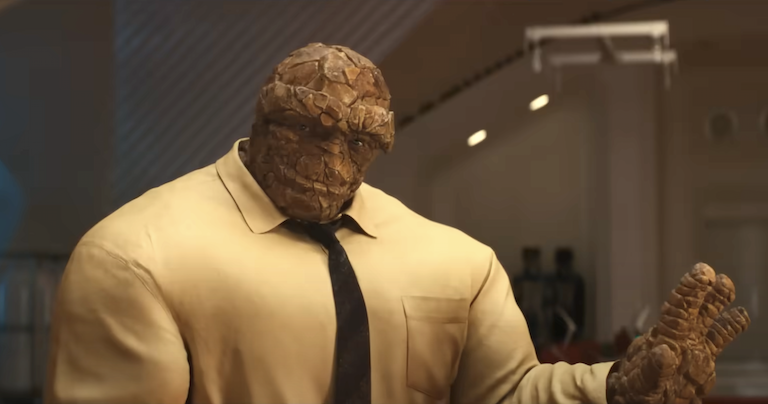
It’s Clobberin’ Time
I’ve always loved the biblical imagery of the moment before creation: “The earth was without form and void, and darkness was over the face of the deep,” it says in Genesis 1:2. But God, “hovering over the face of the waters,” says, “Let there be light.”
Galactus, this dark god of destruction, wants to return the earth to the void, to bring darkness over the face of the deep.
But a light still burns on the planet. And while that light manifests in our Fantastic Four heroes, it goes a bit deeper than that. I think that that light is kindled by three of God’s gifts to us humans: ingenuity, community and family.
Let’s unpack each in turn.
Ingenuity: Reed Richards (aka Mr. Fantastic), the world’s greatest (and, given that he’s played by Pedro Pascal, the most gloriously mustachioed) scientist, embodies this trait. He is emblematic of Proverbs 22:29: “Do you see a man skillful in his work? He will stand before kings; he will not stand before obscure men.”
After much thought, Reed develops a plan that he thinks will foil Galactus’ designs on Earth. We’ll not get into the specifics, but his blueprint requires help and sacrifice from everyone on the planet. And that leads us to …
Community: Verses fill the Bible about the importance of community—especially the community of those who follow Christ. “And let us consider how to stir up one another to love and good works, not neglecting to meet together, as is the habit of some, but encouraging one another, and all the more as you see the Day drawing near,” we read in Hebrews 10:24-25.
Obviously, the whole world—even this alternate world of Earth 828—is not collectively Christian. (We hear rumors of a cult of Galactus forming, in fact.) But the planet’s population still embodies this verse. They buy into Reed’s plan and, together, pull off a scientific miracle. If only our world worked a little more like that.
Family: The Fantastic Four has always been about family. They are one: Reed and Sue Storm (Vanessa Kirby) are married. Sue’s brother, Johnny (Joseph Quinn), is the Human Torch. Ben Grimm (Ebon Moss-Bachrach) may not be related by blood, but he is a friend who’s as close as family.
First Steps pushes especially strong into those familial themes. Sue says that “Family is about connecting to something bigger than yourself.” And when you’re faced with such a huge challenge, that’s important—especially when everything starts falling apart.
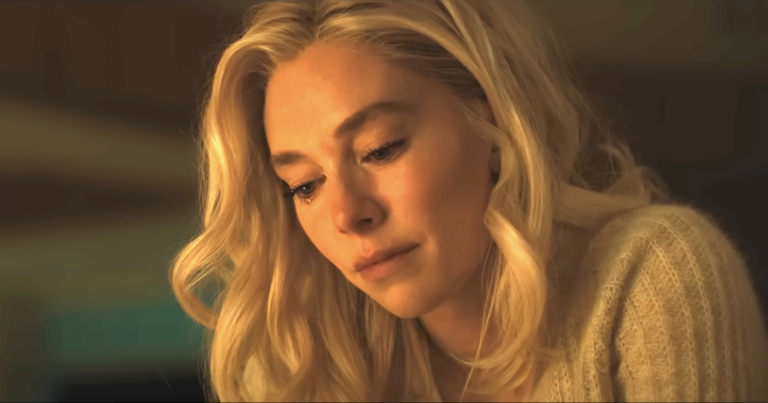
When All Goes Wrong
Despite Reed Richard’s most cerebral efforts and the help of every human on the planet, his original plan fails. The Silver Surfer wreaks mayhem. Galactus’ inexorable path to the planet remains unchecked.
And here, at last, we get to the crux of the entire film: The baby. (And from here on, we’re going to get into some spoilers.)
We learn early on that Reed and Sue are having a child. And according to Reed’s battery of tests, the baby is perfectly, blissfully normal. But when Galactus encounters Sue’s unborn infant, he detects unimaginable power within the tiny vessel—power that might ultimately match his own.
Galactus offers to cut a deal: He’ll spare Earth if Sue gives him her son.
Galactus doesn’t want to kill the baby (Franklin). He wants to, essentially, adopt him. But given Galactus’ heartless, hungry march through the galaxy, it feels like he’s asking for the child’s life.
And so we have a twisted god who asks for, essentially, a child sacrifice—just as in biblical times, followers of Moloch believed that god demanded sacrifice. Indeed, many a religion has accepted and even encouraged the sacrifice of children, especially in times of crisis. And the fact that the Bible so strongly condemns the practice is both an illustration of how much God himself abhorred child sacrifice (read Leviticus 20:1-5), but how common it was in the ancient world—and how tempting it might’ve been to His followers.
In First Steps, on Earth 828, we see the dynamic play out again. And we can see the appeal. The life of one kid for the continued existence of an entire planet? Even Reed understands the logic.
But we shouldn’t judge life by balance sheet. Life is sacred. Life is a gift. And while that gift can in turn be given (as Christianity teaches so profoundly), it must be given willingly and freely. Franklin, of course, can’t consciously give his life for the planet.
So what is the Fantastic Four—especially mother Sue Storm—to do?
Fight like crazy to protect that life. To protect all life.
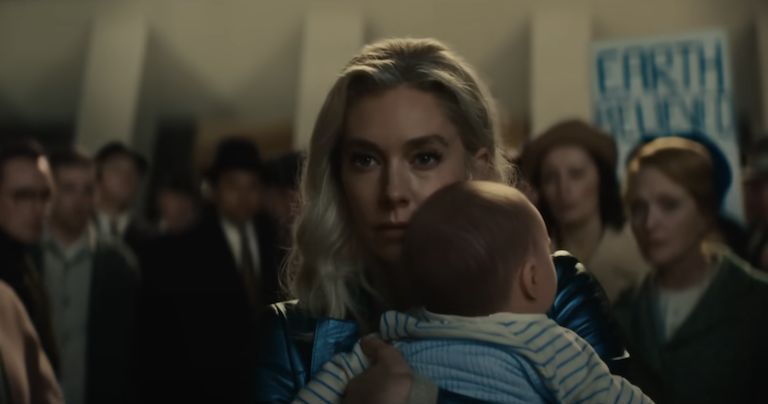
Mother and Child
In the comics, the powers of the respective members of the Fantastic Four reflected, in many ways, aspects of their personalities. Johnny Storm was something of a hothead, so the Human Torch he became. Ben Grimm was a rock-solid friend, so little surprise that he became the rocklike Thing.
Sue Storm was known as The Invisible Woman—a reflection, many say, of how women of the 1960s may have felt undervalued. But she also has the ability to conjure and use force fields—a manifestation, perhaps, of her protective nature.
In First Steps, Sue and her forcefields take pride of place. As a good chunk of the world clamors for her to give up her baby for the greater good, she refuses. In an impassioned speech, she tells onlookers, “I will not sacrifice my child for this world.” But, she adds, “I will not sacrifice the world for my child.” She will fight Galactus, as invincible as he seems. And she does so as a mother—with all the love and ferocity and beyond-reason endurance that a mother will suffer to protect her child.
Franklin couldn’t give his life for the world, even if he would’ve wanted to. But Sue? She can give hers for her baby and the world. And she shows a willingness to do so.
Now, maybe the makers of The Fantastic Four: First Steps have all these spiritual ruminations in mind as they made their movie. But the overarching themes behind them are critical to The Fantastic Four: First Steps. They add a depth that belies the movie’s fun, stylish vibe, setting it apart from just a throwaway superhero flick. And these themes are worth thinking about well after the credits roll.












